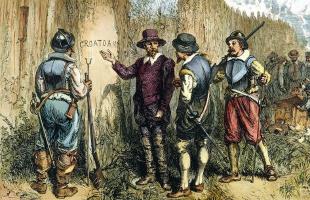Copy Link
Add to Bookmark
Report
Stuck In Traffic Issue 29

====================================================================
Stuck In Traffic
"Current Events, Cultural Phenomena, True Stories"
Issue #29 - October 1998
ÿ
Contents:
Deceit and Denial:
Why President Clinton's scandal isn't
about sex and why it's too late to save
his reputation.
Alan Chello-Jaxon:
A tribute to the passing of a great story
teller.
Review: "Amphibian" by The Changelings:
The latest success from a band that's
taken gothic music where it's never gone
before.
Frank Sinatra's Last Letter to Nancy:
Advice from Frank Sinatra that's good for
us all.
====================================
Current Events
Deceit and Denial
"Every time (the president) talks about trust it makes chills run up
and down my spine. The very idea that the word 'trust' could ever come
out of his mouth after the way he has trampled on the truth is a
travesty of the American political system." -Bill Clinton, speaking of
President George Bush, 1992
Everyone would like to think that electoral politics are issues based
competition in which the merits of policy propositions are debated in
the market place of ideas and the candidate with the "winning"
positions on the issues wins the election. But it's not true. Any
seasoned political consultant can tell you this.
The plain fact of the matter is that public will not even listen to a
candidate they don't trust, much less vote for him, no matter what his
positions on the issues are. That's why so many elections degenerate
into mudslinging battles. That's why you see so many quotes from
candidates like the one above from Bill Clinton.
Is this a good thing or not? Which is more important, that you trust
your political representative or that he states policy positions that
you agree with? This is the fundamental question that has been raised
by President Clinton's scandalous behavior over the past few months.
It's not about sex
The scandal that the United States of America has had to endure since
January isn't fundamentally about sex. If a newspaper had published
lurid sexual pictures of Bill and Hillary in the White House living
quarters, its reputation would be ruined forever. Even if Bill and
Hillary's sexual relationship was unusually titillating in any way, no
one would stand for the invasion of privacy.
And despite American's reputation for being puritanical and squeamish
about sex, they are actually amazingly forgiving of sexual misconduct
by public officials. In fact they are more forgiving of elected
officials than they are of any other segment of the population. Barney
Frank managed to survive the scandal over his misconduct relatively
unscathed, with is political career as strong as ever. Salon
Magazine's attack on Henry Hyde for his past sexual misconduct failed
miserably to detract attention from the President's current scandal.
What's the difference? How can Barney Frank and Henry Hyde survive
their scandals and put it behind them when the President has been
unable to do so? In various combinations, the scandals surrounding
Frank's, Hyde's and Clinton's misconduct involved adultery, sex in the
workplace, and sex with subordinates. All three of which, just for the
record, are still considered to be Bad Things by the vast majority of
Americans. Yet Barney Frank and Henry Hyde were forgiven by the public
and the President hasn't. Why?
Some have suggested that the reason Clinton's scandal has remained in
the public eye is due to a partisan witch hunt by the Republican Party.
But that's putting the cart before the horse. No doubt that
Republicans are taking every advantage being offered them by the
current scandal. No doubt that Clinton's now 10 month old scandal
can't do anything but help the Republican's build their party base and
win elections. One may be disgusted at how they are taking advantage
of the current scandal, but it's difficult to pin blame on them for
creating the scandal.
It's about denial
The public is fascinated by public figures being caught in a lie. They
are fascinated by evasiveness. When a public figure is caught up in a
web of deceit, the public refuses to let go. They love to watch public
figures get more and more entangled.
Take the O.J. Simpson trial for example. The scandal hits the public
with O.J. Simpson barreling down a Los Angeles freeway trying to evade
police. He never satisfactorily explains his behavior after the death
of his ex-wife. As the murder case goes to trial, Simpson does nothing
but evade the search for truth. He refuses to testify. His team of
lawyers attempts to block every line of inquiry that the prosecution
pursues. And the public loves every moment of it. They enjoy watching
O.J.'s dream team of lawyers protecting their client with every evasive
legal maneuver they could think of. But it wasn't until O.J.'s team of
lawyers turned the public's attention to the Los Angeles police
department that public sentiment in the trial began to shift. All of a
sudden, it was the Los Angeles police department that appeared on the
defense. It as the L.A. Police department that appeared to be evading
inquiry and concealing the truth. But even though the public's
attention shifted during that trial, the fuel that sustained the public
interest was their fascination of watching people attempting to deny
and evade the truth.
As another example, look at the Iran-Contra hearings and Oliver North.
As scandals go, It was a relatively dry scandal. The charges being
levied against North, and indirectly against President Reagan, were
serious charges which involved illegal arms sales and illegal
interference into the internal affairs of another country. But the
hearings lasted for weeks and weeks and they dominated the news and the
public attention. Why? Because it appeared that Oliver North was
Hiding Something. Exactly what he was hiding we didn't know, but there
was no doubt at all in anyone's mind that we was doing his best to
avoid facing the facts. He was doing his best to avoid telling the
truth. No one ever quite got to the truth in that particular scandal,
but North's reputation was ruined.
On the other hand, Barney Frank was caught in a scandal involving a
double dose of taboos, homosexuality and prostitution. Yet the scandal
disappeared from the public's attention relatively quickly and he has
continued to win reelection to Congress. Henry Hyde has twice faced
the consequences and humiliation over his extramarital affair twice and
yet his reputation is a solid as it has ever been.
The reason both of these men survived their scandalous misconduct is
because they realized that the issue at stake was trust and reputation.
Both men faced the truth, they took responsibility for their failures,
and, most importantly, they took positive corrective actions to fix the
situation.
Once they overcame their failures and took measures to restore
themselves as honest and reputable men, the salacious details of their
misconduct were not sufficient to sustain interest in the scandal.
Deceit and denial are far more titillating than sex.
The President's Biggest Mistake
One might be tempted to think that the President's biggest mistake was
that he had the affair in the first place. And certainly it was a big
one. As President of the United States, he is probably the most
guarded, scrutinized, and watched person on the planet. How he thought
he could have an extramarital affair with a subordinate employee in the
Oval Office and not get caught is anyone's guess.
But as big a moral failure as that was, it wasn't the biggest.
Clinton's biggest mistake was that he lied about it. It started in
January, with a nationally televised statement by the President:
"But I want to say one thing to the American people. I want you to
listen to me. I want you to listen, again. I did not have sexual
relations with that woman, Miss Lewinsky. I never told anybody to lie,
not a single time, never. These allegations are false and I need to go
back to work for the American people."
But the truth can be a pesky thing. As reports of more and more
evidence to the contrary began to surface, Clinton and his team of
lawyers and political spin doctors spent 8 months trying to deny that
the affair happened. He spent 8 months trying to shift blame to anyone
and anything else except himself.
First, he and his supporters tried to float the idea that the scandal
was all the result of a delusional little girl who was living in a
fantasyland. When that didn't work, the Clinton team tried the
partisan "vast right wing conspiracy" tactic. When that didn't work,
even tried to blame the scandal on discriminatory biases against people
from Arkansas. They have tried to demonize Ken Starr. They have tried
to demonize Linda Tripp. They have complained about the amount of
money that has "been wasted."
And the most outlandish tactic of all attempted by Clinton and his team
has been the claim that this is purely private affair and isn't really
anyone else's business. Future politicians take note, when you go on
national TV and claim that you have not had extramarital sexual
relationship in the workplace with a subordinate, you are _making_ the
issue a national issue and opening up your conduct to public scrutiny.
Some of the Clinton team's efforts at shifting the world's attention
away from Clinton and on to other peripheral aspects of the scandal may
have some merit. No one is going to cite Monica Lewinsky or Linda
Tripp saintly virtuous women. There is no doubt that there is a fair
amount of political partisanship involved.
But Hasn't He Apologized?
This much is known to be true. After testifying before the Grand Jury,
Clinton went on national TV and acknowledged "an improper
relationship". And he apologized for something. But there has been
much debate over what exactly he apologized for. Did he apologize for
having an extramarital affair? Did he apologize for having lied to the
American people in January?
Rather than starting down the road to redemption, the President's
speech looked like more evasiveness and denial. The Clinton spin team
hit the talk show circuit and tried to convince the public that it was
over and done with. The President, they said, has apologized and now
it's time to put the scandal behind us. After all, they asked, do we
_really_ want to hear the President acknowledge every lurid detail of
his affair on national TV.
The answer is of course no. Hearing the lurid details will not make
the scandal go away. What will make the scandal go away is to have the
President acknowledge that he had an extramarital affair, that it was
in the workplace with a subordinate. Then just as in the case with
Barney Frank and Henry Hyde, we need to see the President take
positive, proactive steps to correct the wrongs that he has done and we
need to see the President take positive action regain the trust of the
American people.
The President has done none of these things. Instead, his actions have
been more along the line of, "now it's time to get back to business as
usual."
In short, the President made a vague uncompelling apology and has made
no actions toward atonement whatsoever.
But it may be too late
Of course, now the scandal has grown so large, it's difficult to
imagine what Clinton can do to make amends. What could he possibly do
to make up for the scandal he's caused since January of this year?
After 10 months of scandal, there's not much hope of Clinton regaining
the trust of the American people in a few days or even a couple of
weeks.
This is a big problem for Clinton because Ken Starr's report to
Congress wasn't about his failure to be a moral leader. Ken Starr's
charges are not about losing the trust of the American Public. His
report is about specific allegations of possible criminal actions by
the President in his attempts to evade the truth about his affair.
If Clinton had been able to face up to his failures and make proper
atonement for them, and if he had started work on regaining the trust
of the American public, he might have been able to prevent Impeachment
hearings because the public would then see the hearings as persecution
of a man who has already redeemed himself.
As the situation stands now, it is impossible to stop Impeachment
hearings. All indications are that President Clinton will continue to
shift blame elsewhere where he can, accept as little personal guilt as
possible, and take no actions for atonement. There seems to be plenty
of hard evidence and lots of truth left for to make Clinton squirm.
Americans won't be able to get enough of it. They won't let the matter
drop. And regardless of whether Clinton is found guilty or innocent of
the legal charges levied against him in Ken Starr's report, he
credibility as a leader has been ruined.
====================================
True Story
Alan Chello-Jaxon: RIP
Alan Chello-Jaxon passed away in early September, 1998. Officially he
died of heart failure due to other medical complications. But the fact
is he died of old age after living a long and full life.
I can't remember the day I met Alan Chello-Jaxon. Whether you met him
five minutes ago or five years ago, you always feel like you've known
him your whole life. But I can remember where I met him, which was at
Cup-A-Joe coffee house in Raleigh, near the NC State campus.
Despite harassment from the local Tobacco Nazis who have a
holier-than-thou attitude about teen smoking, Cup-A-Joe is the most
vivid place in Raleigh to hang out. It caters to an amazing mix of
folks: NC State students pulling all night study sessions in everything
from engineering to veterinary medicine, fashionably oppressed goths,
heavily jackbooted and pierced punks, wayward programmers in for a late
night caffeine boost, starving artists, and even yuppie couples from
the `burbs. The music is always great, the crowd always friendly, the
coffee cups are always huge.
And in the center of it all was Mr. Alan Chello-Jaxon. He was the
sort of person you hoped to meet while hanging out in coffee houses.
He was one of those people that could effortlessly sit down at a table
with a group of strangers, introduce himself and start telling his life
story. People these days give lots of lip service to the notion of
"diversity", in which people from all social groups and strata are
supposed to mix and mingle freely, celebrating their own identity while
thriving on their differences. Alan is the only person I've ever met
that seemed to be able to fully put this principle in to practice, and
it came to him naturally. Alan had a great knack for drawing out
peoples' passions. It didn't matter what you were into. You could be
into radical libertarian politics, an up and coming punk band, a cool
new programming language, or herbal gardening. It didn't matter. Alan
could get you to talk about it. He was a master at the dying art of
conversation
Alan's particular passion was underground artists. He was a patron in
the truest and noblest sense of the word. He bought his fair share of
art from unproven and unknown artists. But more importantly he
promoted them. He helped them find venues to show their work. He made
introductions. He supported their ambitions. On more than one
occasion he had been known to lobby the parents of high school student
to let their children attend art school.
Above all, Alan was a great story teller. Alan claims to have been
married seven times and could tell you stores about each of his wives.
And he claims to have had so many varied careers, it's difficult to
catalog them all. His more common stories revolved around his days
living in New York City, running two different art galleries. But he
told many stories about working as a newspaper stringer in the deep
south, during the civil rights unrest of the 60s. He claims to have
served in the military for 2 years. He told stories about saving
artists from going insane. He told stories of business deals that fell
through. He told stories of being in the middle of riots. He told
stories about the wild performances by Ginsburg, during his hey day.
He told stories of being a sports broadcaster, covering baseball games.
The fact of the matter is that Alan claimed to have had so many
different careers, wives, and relationships throughout the years that
it's difficult to believe them all. But he was so good at telling
stories about his life that they were more like prose ballads. They
inspired you to live deliberately and live large. And while they may
have transcended the notion of "legally accurate" truth, they touched a
universal truth. That is his legacy.
I want to believe.
====================================
Cultural Phenomena
Review of "Amphibian" from The Changelings
Like no other band before them, the Changelings have once again managed
to take an unusual pallate of musical instruments, ranging from a toy
accordion to violins, from keyboard synthesizers to classical guitar;
used them to build soundscapes around vocal arias; and created a sound
that's both haunting and beautiful, tragic and uplifting.
While their last album, Terra Firma, drew heavily from a Middle Eastern
influence, most of the songs on their latest album, Amphibian, are
built loosely around tales of life at the edge of the water and the
creatures that inhabit it.
The first track, "Deeper Than Light," sets the musical stage. They
introduce haunting echoing soundscapes that are reminiscent of whale
song. The vocals are dissonant, as if they are coming from far away
and tell the story of somone who hears the call of lost love, calling
them out to sea to drown.
"Frog Song" and "Afternoon of a Newt" introduce a living presence to
life on the edge of the water. "Frog Song" tells the tale of frogs
contemplating the rise of the cities and how they are in contrast to
those who "choose a simpler beauty, pooling out wills for the globe."
And as the frogs watch the world, they wait for the day when "our day
has come to rise up/we'll take the city by storm/crushing non-circular
things." No cute, princess bait here. "Afternoon of a Newt" adds a
chamber music period feel to the background of the album.
Against this backdrop we have two songs songs that loosely tell the
tale of mermaids and life on the sea. "Port Royale" is a true ballad
that tells the story of a Pirate Captain who captures a King's
daughter. But rather than sell her back for ransom, he tries to win
her heart. When she refuses him her love he throws her overboard. And
as she's sinking to the bottom of the ocean she sings out one last song
that so captivates the sea and the fishes and the whales whe becomes a
mermaid, And eventually gets her revenge on the Captain. It's a great
tragedy with a refrain that captures the adveturous yet sad lonely
lives of pirates.
"Oceana" is the central track for the whole album. It pulls elements
from all the background songs. tells the tale of a mermaid who loses
her love to the deadly fishing nets of a sailor and yearns for revenge
against mankind.
Another strong track on the album is "Caterwaul." Here Regeanna Morris
steps out of her usual gothic vocal style and sounds a little more
modern, a little like Kate Bush perhaps. At first it soundls like it's
going to be a cutesy song about a cat, but you quickly realize it's
bout the lusty, blood thristy predators behind those cute, furry faces.
Finally, my personal favorite track on the album is "Maelcum's
Righteous Dub," which sounds like something Victor Hugo would compose
if he had been a reggae musician instead of a gothic novelist.
Lyrically, the only thing I can figure is that it's about a woman
trapped in some sort of virtual reality gone horrbly wrong.
A highly recommended album. If you can't find it in your local record
store, you can get it directly from the band at
http://www.draven.net/changelings
====================================
Cultural Phenomena
Frank Sinatra's Last Letter To Nancy
Chicken---a thought.
Strange, but I feel the world we live in demands that we be turned out
in a pattern which resembles, in fact, is a facsimile of itself. And
those of us who roll with the punches, who grin, who dare to wear
foolish clown faces, who defy the system -- well; we do it, and bully
for us!
Of course, there are those who do not. And the reason I think it that,
(and I say this with some sadness) those up-tight, locked in people who
resent and despise us, who fear us, and are bewildered by us, will one
day come to realize that we possess rare and magical secrets, and more
-- love.
Therefore, I am beginning to think that a few, (I hope many) are
wondering if maybe there might be value to a firefly, or an
instant-long roman candle.
Keep the faith
Dad
As forwarded to me from the publisher of _The Tower of Babel_ `zine.
Check them out at http://www.towerofbabel.com
=====================================
About Stuck In Traffic
Stuck In Traffic is a monthly magazine dedicated to evaluating
current events, examining cultural phenomena, and sharing true
stories.
Why "Stuck In Traffic"?
Because getting stuck in traffic is good for you. It's an
opportunity to think, ponder, and reflect on all things, from the
personal to the global. As Robert Pirsig wrote in _Zen and the Art
of Motorcycle Maintenance_, "Let's consider a reevaluation of the
situation in which we assume that the stuckness now occurring, the
zero of consciousness, isn't the worst of all possible situations,
but the best possible situation you could be in. After all, it's
exactly this stuckness that Zen Buddhists go to so much trouble to
induce...."
Submissions:
Submissions to Stuck In Traffic are always welcome. If you have
something on your mind or a personal story you'd like to share,
please do. You don't have to be a great writer to be published here,
just sincere.
Contact Information:
All queries, submissions, subscription requests, comments, and
hate-mail about Stuck In Traffic should be sent to Calvin Stacy
Powers preferably via E-mail (powers@ibm.net) or by mail (2012
Talloway Drive, Cary, NC USA 27511).
Copyright Notic:
Stuck In Traffic is published and copyrighted by Calvin Stacy Powers
who reserves all rights. Individual articles are copyrighted by
their respective authors. Unsigned articles are authored by Calvin
Stacy Powers.
Permission is granted to redistribute and republish Stuck In Traffic
for noncommercial purposes as long as it is redistributed as a whole,
in its entirety, including this copyright notice. For permission to
republish an individual article, contact the author.
E-mail Subscriptions:
E-mail subscriptions to the ASCII text edition of Stuck In Traffic
are free. Send your subscription request to either address listed
above.
Print Subscriptions:
Subscriptions to the printed edition of Stuck In Traffic are
available for $10/year. Make checks payable to Calvin Stacy Powers
and send to the address listed above. Individual issues are
available for $1.
Online:
The ASCII text editions of Stuck In Traffic is archived on the
internet by etext.org at the following URL:
http://www.etext.org/Zines/ASCII/StuckInTraffic/
The Web based version of Stuck In Traffic can be found at the
following URL:
http://www.StuckInTraffic.com/
Trades:
If you publish a 'zine and would like to trade issues or ad-space,
send your zine or ad to either address above.
Alliances:
Stuck in Traffic supports the Blue Ribbon Campaign for free speech
online. See http://www.eff.org/blueribbon.html for more
information.
Stuck In Traffic also supports the Golden Key Campaign for electronic
privacy and security. See http://www.eff.org/goldkey.html
====================================================================






















